新视野英语教程 unit 3
新视野大学英语读写教程unit3课文与单词(NewhorizonsCollegeEngli..
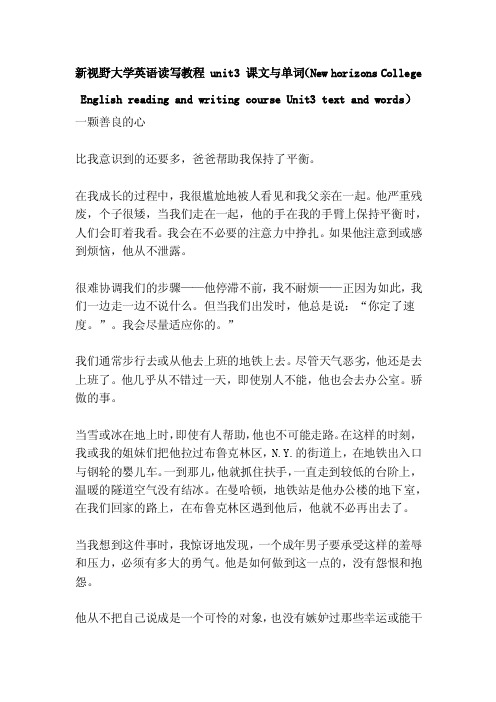
新视野大学英语读写教程 unit3 课文与单词(New horizons College English reading and writing course Unit3 text and words)一颗善良的心比我意识到的还要多,爸爸帮助我保持了平衡。
在我成长的过程中,我很尴尬地被人看见和我父亲在一起。
他严重残废,个子很矮,当我们走在一起,他的手在我的手臂上保持平衡时,人们会盯着我看。
我会在不必要的注意力中挣扎。
如果他注意到或感到烦恼,他从不泄露。
很难协调我们的步骤——他停滞不前,我不耐烦——正因为如此,我们一边走一边不说什么。
但当我们出发时,他总是说:“你定了速度。
”。
我会尽量适应你的。
”我们通常步行去或从他去上班的地铁上去。
尽管天气恶劣,他还是去上班了。
他几乎从不错过一天,即使别人不能,他也会去办公室。
骄傲的事。
当雪或冰在地上时,即使有人帮助,他也不可能走路。
在这样的时刻,我或我的姐妹们把他拉过布鲁克林区,N.Y.的街道上,在地铁出入口与钢轮的婴儿车。
一到那儿,他就抓住扶手,一直走到较低的台阶上,温暖的隧道空气没有结冰。
在曼哈顿,地铁站是他办公楼的地下室,在我们回家的路上,在布鲁克林区遇到他后,他就不必再出去了。
当我想到这件事时,我惊讶地发现,一个成年男子要承受这样的羞辱和压力,必须有多大的勇气。
他是如何做到这一点的,没有怨恨和抱怨。
他从不把自己说成是一个可怜的对象,也没有嫉妒过那些幸运或能干的人。
他在别人身上寻找的是一颗“善良的心”,如果他找到了一个,主人对他来说已经足够好了。
现在我长大了,我相信这是判断人的适当标准,尽管我还不知道什么是“好心肠”。
但我知道我自己没有时间。
由于无法参加许多活动,我父亲仍然试图以某种方式参与。
当一个当地棒球队发现自己没有教练时,他就坚持下去。
他是一个见多识广的棒球迷,他过去常带我地埃比茨棒球场观看布鲁克林道奇队的比赛。
他喜欢去参加舞会和聚会,在那里他可以坐着看。
新视野大学英语读写教程第二版Unit 3课后练习题答案
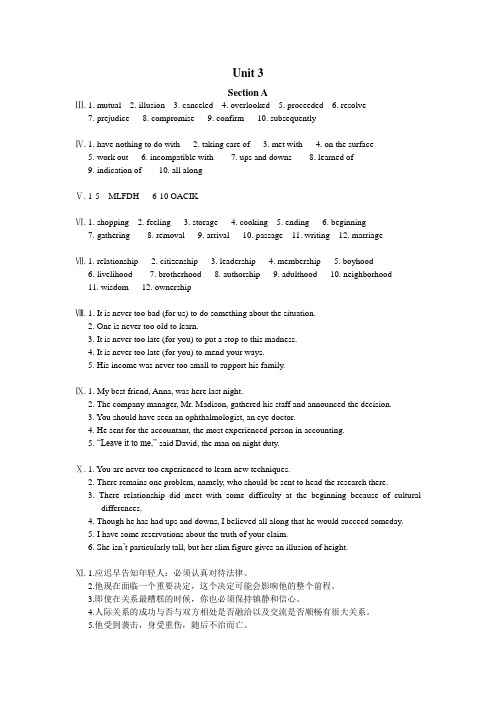
Unit 3Section AⅢ. 1. mutual 2. illusion 3. canceled 4. overlooked 5. proceeded 6. resolve7. prejudice 8. compromise 9. confirm 10. subsequentlyⅣ. 1. have nothing to do with 2. taking care of 3. met with 4. on the surface5. work out6. incompatible with7. ups and downs8. learned of9. indication of 10. all alongⅤ. 1-5 MLFDH 6-10 OACIKⅥ. 1. shopping 2. feeling 3. storage 4. cooking 5. ending 6. beginning7. gathering 8. removal 9. arrival 10. passage 11. writing 12. marriageⅦ. 1. relationship 2. citizenship 3. leadership 4. membership 5. boyhood6. livelihood7. brotherhood8. authorship9. adulthood 10. neighborhood11. wisdom 12. ownershipⅧ. 1. It is never too bad (for us) to do something about the situation.2. One is never too old to learn.3. It is never too late (for you) to put a stop to this madness.4. It is never too late (for you) to mend your ways.5. His income was never too small to support his family.Ⅸ. 1. My best friend, Anna, was here last night.2. The company manager, Mr. Madison, gathered his staff and announced the decision.3. You should have seen an ophthalmologist, an eye doctor.4. He sent for the accountant, the most experienced person in accounting.5. “Leave it to me,” said David, the man on night duty.Ⅹ. 1. You are never too experienced to learn new techniques.2. There remains one problem, namely, who should be sent to head the research there.3. There relationship did meet with some difficulty at the beginning because of culturaldifferences.4. Though he has had ups and downs, I believed all along that he would succeed someday.5. I have some reservations about the truth of your claim.6. She isn’t particularly tall, but her slim figure gives an illusion of height.Ⅺ. 1.应迟早告知年轻人:必须认真对待法律。
新视野英语教程第三版unit3
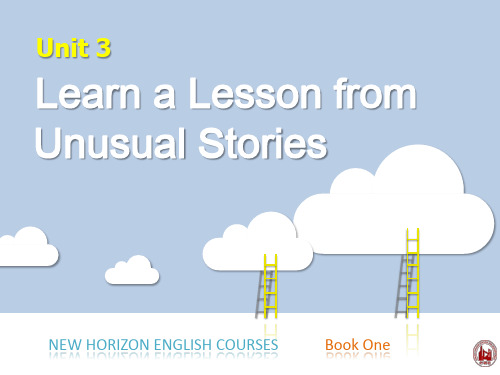
Learn a Lesson from Unusual Stories
NEW HORIZON ENGLISH COURSES
Book One
Unit 3
Learn a Lesson from Unusual Stories
1
Around the
Topic
Leading in Exploring the Topic Plus Activities
Text A
Exercises
Around the Topic
Section A
Section B
Section C
2. Love and friendship, can we give up one for the other?
At the very beginning of this clip, we hear a short humorous dialogue between Pumbaa and Timon. Timon believes that the romantic love between Simba and Nala threatens to end the fellowship of them three, their trio (Simba, Pumbaa and Timon). At the end of the song, we can deeply feel the sadness of Pumbaa and Timon. Why are they so sad? Because they all love Simba. They are afraid that Simba would leave them forever because of his reunion with Nala and his regaining of the kingship. Eventually their love for their friends wins them over and they play instrumental roles in Simba’s retaking of Pride Rock later.
新视野大学英语读写教程Unit_3_Focus-A课件

该句出自《培根-论读书》很经 典:)~~
Histories make men wise; poets witty; the mathematics subtle; natural philosophy deep; moral grave; logic and rhetoric able to contend. Abeunt studia in morse. “读史使人 明智,读诗使人灵秀,数学使人周密, 科学使人深刻,伦理学使人庄重,逻辑 修辞之学使人善辩;凡有所学,皆成性 格。”
Association
consequently= therefore, as a result The bank refused to help the company; consequently, it went out of business.
10. harbor (L28)
n. a sheltered port 港口/避难所
overhear 偶然听到 outlook 观点;前景;景色 pretend not to notice 忽视,未注意到 ; 原谅
•她没有计较他的无礼,并尽量装作没事的样子。 •我们决定宽容他的过错。
Key
•She overlooked his offensiveness and tried to pretend nothing had happened. •We decided to overlook his mistake. Association
这些动词均含“忍受”之意 stand: 口语用词,常可与bear换用,但侧重指经受得起 bear: 强调容忍,是普通用语, 侧重于表示“忍受沉重或
难办的事”。 endure: 书面用词,指长时间忍受痛苦和不幸,着重体 力或意志力的坚强不屈服。 tolerate: 指以自我克制的态度,对待令人反感或厌恶的 东西,含默认宽容意味。 suffer: 通常指非自愿或被迫忍受各种痛苦、困难或不快, 强调受到苦难。 put up with:为口头用语,一般指容忍较小的事情,具 有宽容、默认、将就某人或某事的意思。
新视野大学英语视听说教程最新版第三册Unit3答案(含听力原文)
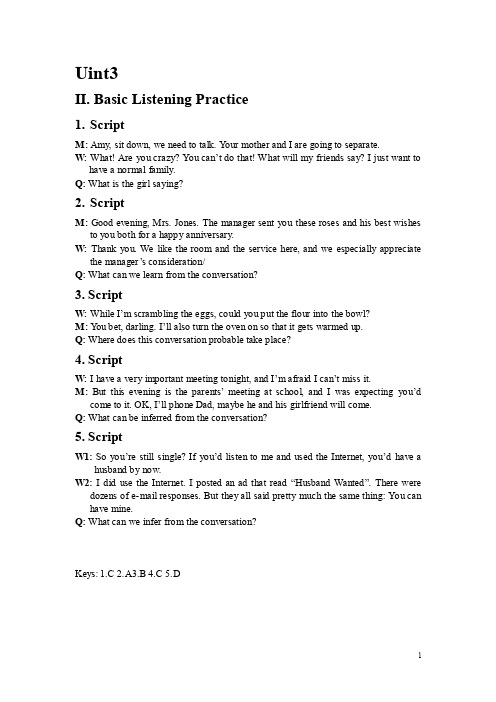
Uint3II. Basic Listening Practice1.ScriptM: Amy, sit down, we need to talk. Y our mother and I are going to separate.W: What! Are you crazy? You can’t do that! What will my friends say? I just want to have a normal family.Q: What is the girl saying?2.ScriptM: Good evening, Mrs. Jones. The manager sent you these roses and his best wishes to you both for a happy anniversary.W:Thank you. We like the room and the service here, and we especially appreciate the manager’s consideration/Q: What can we learn from the conversation?3. ScriptW: While I’m scrambling the eggs, could you put the flour into the bowl?M: Y ou bet, darling. I’ll also turn the oven on so that it gets warmed up.Q: Where does this conversation probable take place?4. ScriptW: I have a very important meeting tonight, and I’m afraid I can’t miss it.M: But this evening is the parent s’meeting at school, and I was expecting you’d come to it. OK, I’ll phone Dad, maybe he and his girlfriend will come.Q: What can be inferred from the conversation?5. ScriptW1: So you’re still single? If you’d listen to me and used the Internet, you’d have a husband by now.W2: I did use the Internet. I posted an ad that read “Husband Wanted”. There were dozens of e-mail responses. But they all said pretty much the same thing: You can have mine.Q: What can we infer from the conversation?Keys: 1.C 2.A3.B 4.C 5.DIII. Listening InT ask1: Reasons for a DivorceScriptW: I’m divorcing my husband.M: How long have you been married?W: Thirteen years.M: Do you have children?W:Y es, and I have to protect them from any more harm from my husband’s irresponsibilityM: So, what are your grounds for divorce?W: Well, first of all, he keeps changing jobs. We’ve had moved four times in thirteen years!M: And, you believe that will be good grounds for divorce?W: I do have a right to stability for my children and myself, don’t I?M: Aren’t they his children, too?W: But my husband isn’t fulfilling his duties!M: Is he paying the bills?W: Well, yes, but we just live around the poverty line. Our kids are being teased by other kids at school because we can’t dress them in good clothes! We have to live in a small department and drive an old car!M: Does the car run?W: Yes, but it looks OLD!M: Do you yell at him and call him names?W: Well, he yells at me!M: So, those are the reasons to not honor your husband. Are you going to give him joint custody in this divorce?W: No, just visitation rights.M: Why?W: Because the law permits me to.M: And, what about the financial demands of this divorce?W: I’m demanding half of all we have, which isn’t much, and large support payments. After thirteen years marriage, the woman wants to divorce her husband, claiming he is irresponsible. When asked for the specific grounds for divorce, she gives these reasons: First, he keeps changing jobs, and the family has had to move four times in thirteen years, but she wants stability for her children and herself. Second, although he is paying the bills, they just live around the poverty line. Her children are being teased by other children for not dressing good clothes. Also, they had to live in a small apartment and drive an old car, though it still runs. Worse still, the husband yells ather, though she admits she also yell at him and calls him names. As for the divorce arrangements, the woman will give the husband only visitation rights instead of joint custody. Moreover, the woman will demand half of all they have and large support payments.T ask 2: What four-letter words?ScriptDorothy was the only child of her family, born when her parents were mid-aged. They spoiled her badly. At the age of 33 she still lived at home. Her mother and father treat her like a princess. She seemed perfectly content with that situation, so her friends were surprised when she announced she would soon get married. People who knew her well said the marriage wouldn’t last long. But for the present, she and her new husband approached happy.As soon as the newly couple returned from their honeymoon, the bride called her mother.“How does everything go?” her mother asked.“Oh, Mom,”she began, “the honeymoon was lovely! So romantic! We had a wonderful time. But on our back, Bob started using terrible language. Stuff I’d never heard before. Really awful four-letter words. Y ou’ve got to come get me and take me home. Please, Mom!” the new bride sobbed over the telephone.“But, honey,” the mother asked, “What four-letter words?”“I can’t tell you, Mom. They’re too awful! Come get me, please!”“Darling, you must tell me what has upset you so much. Tell me what four-letter words he used.”Still sobbing, the bride said, “Mom, words like dust, wash, iron, and cook.”Keys: FTFFTT ask3: A Woman Who Chose Not to RemarryScriptAfter 17 years of marriage, my husband left me for my best friend, Monica. What I had feared most became reality: I became the single parent of two young children. My daughter grew increasingly unhappy. Seven-year-old Joanna had anxiety attacks when ever she was left alone for more than a few minutes. Five-year-old Sophie would vomit every meal. Under the psychological pressure, I thought about remarriage. Myfriends arranged dinner with single men and invited me to parties to meet the latest “someone special”.But later I changed my mind. A colleague of mine said, “Second marriages usually end in divorce, and children are destroyed by it.”There is some truth in his words. Research published in 2004 showed that children in blended families were no more emotionally healthy than those in single-parent families.Not long ago, my now-teenage daughter and I went to lunch at our favorite Italian restaurant. While eating, we talked about a friend of ours who was divorcing her second husband. We were worried about how the break would harm her three childre n, two of whom were struggling to get free of drugs. Joanna put down her fork and looked at me. “Mom, I’m glad you didn’t remarry,”she said. “If you had divorced again, I might have tried drugs or even consider suicide.” At that moment, I realized, once again, that singleness was right choice for me.1.What was the speaker most afraid of?2.Which of the following is NOT true?3.What did the speaker’s colleague say?4.Which of the following is true?5.If the speaker had divorced again, what might her daughter, Joanna, have done? Kes: 1C 2.A3. B 4.B 5.BIV. Speaking OutMODEL 1 Is youth wasted on the young?Amy: I’d like to talk to you, so stop what you’re doing for a minute.Bill:What is it, Amy? I’m having a hectic time working on this report for tomorrow’s meeting.Amy: Well, you’re always pretty busy, and it’s been more five years, almost six, since we were married.Bill:Y es, time has gone so fast, but they’ve been good years.Amy: I know, but I want to have a baby—I want us to have a baby.Bill:I know you do. But remember, we said we’d wait until we could afford it. Amy: But five years is a long time to wait. Anyway, it’s long enough.Bill:I’m this close to getting a promotion.Amy:What has that got to do with it? We could wait forever if we wait for the “perfect” moment. Soon we’ll be too old to enjoying having a baby.Bill:Y ou know,you have a good point. This report can wait. I’ll do it tomorrow morning. Let’s open a bottle of wine and enjoy ourselves.Now Y our TurnSAMPLE DIALOGA: I’ve got something important to tell you: I’m pregnant.B: What? Y ou’re pregnant? Wow, I’d love to have a baby.A: Well, I understand you want to be a father. It’s been more than three years, almost four, since we were married.B: Y es, time has passed so quickly, but we still didn’t have a baby.A: I know, but we can’t afford to have one now. If I leave my job for more than two weeks, I’ll lose it forever.B: I know you will. But remember, if we don’t have one now, it’ll be too late. We’ll be busier in future.A: There is something in what you said. Four years is a long time to wait. But I really like my job. What’s more, I’m very close to getting promotion.B: But a baby borne by a woman in her 30s may be physically and intellectually less healthy. If we wanted to hold onto your job, we would wait forever. Soon we’ll be too old to enjoy a baby.A: Y ou really have a point. I’ll choose the baby over the job.B: Good, I’ll try harder to make both ends meetMODEL2 So many people in the United States get divorced! ScriptKim: Hi Amy.Amy: Hi! Look at this headline, Kim.Kim: Wow! So many people in the United States get divorced!Amy: But this is not uncommon in west. In some places, the divorce rate can be as high as 50 percent.Kim: It seems strange to me that Westerners fall head heels in love quickly,if not at first sight; but they also leave each other quickly.Amy:Is it the same in your country?Kim: I don’t think so. In my country, some marriages break up, but most couples stay together.Amy:Do people get married young?Kim: Not really. Not many people get married before the age of 20.Amy:Hmm. Do woman usually work after they get married?Kim: No, a lot of women stay home to take care of their families. But more women work now.Now Y our TurnSAMPLE DIALOGA: It seems strange to me that Westerners fall head heels in love quickly, but they also leave each other quickly.B: Is it the same where you live?A: I don’t think so. In my country, most couples stay together.B: What is the divorce rate in your homeland?A: The divorce rate can be as low as 10 percent.B: That’s quite lower than in our country.A: Well, what’s the divorce rate in your country?B: About 50 percent, if I’m not mistaken.A: Oh, that’s really high!B: Do people get married young?A: Not really. Not many people get married before the age of 22.B: Many of our young people get married before 20. Is it common for women in your country to work after they marry?A: Y es, most wives work even after they’ve got a baby.B: In my country, a lot of wives stay home to look after their families.MODEL3 Why not have both our parents here for Christmas? ScriptAmy: Y ou know, Christmas is coming. And I haven’t seen Dad for ages—he always has such great stories to tell.Bill: I know we went t my folks’last year, but my Mom’s been pretty sick. This might be her last Christmas.Amy: She’s been ill, but don’t exaggerate. Y ou just don’t like my mother. That’s why you don’t want to go to my parentsBill:She’s never liked me. Never thought I was good enough for you.Amy: Well, you’re not…But seriously, Mom’s not so sad. She’s just got a thick skin and likes to hide her feelingsBill:I don’t think so.Amy: Why not have our both families here for Christmas?Bill: That would make twenty-two of us if we invited everybody.Amy: Why not just have our parents here for Christmas?Bill: Good idea. Just don’t sit me next to your mother.Now Your TurnSAMPLE DIALOGA: Y ou know, the Spring Festive is coming, and we have to consider where to have the Spring Festive Eve dinner.B: What have you got in mind?A: Since I’ve been busy, I haven’t seen mom for quite some time—she’s always been so kind to us.B: I know we went t my folks’ last year, but my mom’s been sick. She needs comfort. A: My parents also need company. If I don’t have the Spring Festive Eve dinner with them for two years running, they will be extremely disappointed. As a matter of fact, my mom is already blaming me for neglecting them.B: What can we do then?A: Let me think. Why not invite our parents here for the dinner?B: But they live so far away from us. It’s inconvenient for old people.A: Then we can invite four of them to a restaurant near them.B: Good, idea. On the next morning we can visit both our parents.A: And don’t forget to bring gifts.V. Let’s T alkScriptIf you want me to tell you why I remarried, that’s my story.Remarried is the last thing I’d consider for two years after my divorce. I had heard about the high rate of remarriage failure. More importantly, I wondered how remarrying would affect my 10-year-old son. My heart ached when I saw my son draw a picture of himself, my ex-wife and me holding hands, with sadness on our faces. Since my parents have married and divorce eight times altogether, I hope my son would not have to go through the same pain I had experienced. As a result, my primary focus after divorce was my relationship with my son John, not finding a wife. As time went by, my son gradually grew up, and he became of my loneliness and anxiety. One day he asked me to consider dating. The first timer he said this, I ignored him. The second time he brought it up, I reconsidered my reservations about dating. I began to date Maria. As our relationship developed over the following year, I was concerned about my son would actually respond to her. At first, John’s affection for Maria was lukewarm. For instance, he would hug her, but the act seemed mechanical. But after several times, he warmed up to her. Seeing that the time was ripe, I asked Maria to marry me. She accepted, so our family of two smoothly became a family of three. Thinking back, I believe my remarrying was the right choice.Some single-parents are still besitant about remarrying. Now that you’ve heard my story, I hope you won’t hesitate and let golden opportunities slip through your fingers.DebateSAMPLEA: On the whole I don’t support remarriage. Too many remarriages have turned out to be unsuccessful and end in divorce.B:If you say many remarriages have failed, that means other remarriages have survived, or even bloomed. We should not only look at the dark of the issue.A:But ther e’re too many factors contribute to the failure of a second marriage. For example, as you become older, you may find it increasingly difficult to adjust to a different pattern of life with a new mate. Once there’s a conflict neither is willingto give in.B: There’re conflicts everywhere, but you should not neglect that an adult has psychological and physical needs. Without a companion, one may feel lonely and anxious.A: In a new family the husband tends to compare his new wife’s weak point with his ex-wife’s strong point. And the wife does the same.B: I wish you’d seen the film The Sound of Music. The governess Maria blended so smoothly into the Captain’s family.A:It is not easy for children to accept the new mother or father. It is simply impossible for them to forget their birth-mother’s loving care and the happy moments in their childhood.B: But how happy are the Captain’s seven children with their adopted mother Maria! If the new mother shows genuine care for the kids, they will gradually warm to her. On the other hand, many children in a single-parent family are under psychological pressure and suffer from anxiety attack. So, the single life is not the right choice. VI. Further Listening and SpeakingT ask1: Early MarriageScriptAt the age of 12, Lisa has been married for three years to a young man she met just after finishing secondary school. He treated her well. She almost died during the birth of their first child, born a year after their marriage. The second child, born 18 months later, was also a girl. Lately she and her husband quarrel frequently. She wants to go to vocational school to learn skills to add to the family income, but his mother insists she stay home and produce a son.This example is by no means exceptional. Early marriage is common in many parts of the world. Early marriage leads to early motherhood. In some developing countries, 20 percent or over half of the women give birth to their first child before the age of 18.Expectations from parents, in-laws and society are to produce a child as soon as possible. Many young wives feel pressure to bear son. This typically results in early and frequent pregnancies.In developing countries, more than half a million women die every year from causes related to pregnancy. There are four important reasons for these deaths. Birth are either “too soon, too close, too many, or to late”. According to statistics, it is young women who most die during pregnancy.1.At what age did Lisa give birth to her first child?2.What does Lisa want?3.Why do women in some developing countries have babies early?4.What are the reasons women die from childbirth?5.What is the main idea of the passage?Keys: 1.B 2.D3.A 4.D 5.CT ask 2: Nuclear Family Living PatternsScriptA nuclear family is typical in high-industrialized societies. Beginning in the early 20th century, the two-parent family known as the nuclear family was the predominant American family type. Generally children live with their parents until they go away to a college or university, or until they acquir e their own jobs and move into their own apartment or home.In the early mid-20th century, the family typically was the sole wage earner, and the mother was the children’s principle care giver. Today, often both parents hold jobs. Dual-earner families are the predominant type for families with children in the United States.Increasingly, one of the parents has a non-standard shift; that is, a shift that does not start in the morning and end in later afternoon. In these families, one of the parents manages the children while the other works.Prior to school, adequate day care of children is necessary for dual-earner families. In recent years, many private companies and home-based day care centers have sprung up fulfill this need. Increasingly, a company’s arrangement of day care as well as government assistance to parents requiring day care is occurring.T ask3: They are coming for Christmas,ScriptA man in Phoenix calls his son in New Y ork the day before Christmas and says, “I hate to ruin your day, but I have to tell you that your mom and I are divorcing, Forty-five years of misery is enough..”“Dad, what are you talking about?” the son screams.“We can’t stand the sight of each other any longer,”the father says. “We’re sick of each other, and I’m sick of talking about this, so you call your sister in Chicago and tell her.”Frantic, the son calls his sister, who explodes on the phone.“Oh, heck, they’re getting divorced,”she shouts. “I’ll take care of this.”Losing no time, she call her father and screams at him, “Y ou are not getting divorced. Don’t do a single thing until I get there. I’m calling my brother back, and we’ll both be there tomorrow. Until then, don’t do anything! DO YOU HEAR ME?”Then she quickly hangs up.The old man hangs up his phone and heaves a sigh of relief. He turns to his wife and says merrily, “Okay, they are coming back for Christmas and paying their own way.”For Reference:1. He and the boy’s mother are divorcing.2. Forty-five years of misery is enough. They can’t stand the sight of each other any longer. They’re sick of each other.3. He gets frantic and calls his sister.4. They will come back home and stop the parents from divorcing.5. He is happy, for his son and daughter will come back for Christmas and pave their own way.News ReportPrince More Precious Than the DiamondScriptPeople have long known the saying ’s best friend.” But this may be changing. There’s a new stone market, tanzanite, and it is giving diamonds some serious competition.Tanzanite was one of a number of gems discovered in East Africa in the 1960s. The new colors and varieties changed the gem market. But the real gem among these stones was tanzanite, discovered in 1967 in Tanzania. The stone was named after its country of origin by New Y ork’s Tiffany and Co. which introduced it to the world. It draws one’s attention quickly with its color—blue, purple or bronze, depending on the direction it is viewed from.More important for its value, though, is its rarity. Tanzanite has been found in only one small area, near Mount Kilimanjaro, in Tanzania. And its supply will probably befully mined in the next two decades.As one mining official puts it, “It should never have really occurred in the first place. It did occur. And only this one deposit on this entire planet that is known…makes it more than a thousand times rarer than diamonds. And certainly within the next 15 to 20 years, there will be no more tanzanite to be mined.”The current value of the tanzanite market, at U.S. $10 billion, is equivalent to that of diamonds. And so another saying “Diamonds are forever”may lose some of its meaning.。
新视野大学英语第三版视听说教程3答案
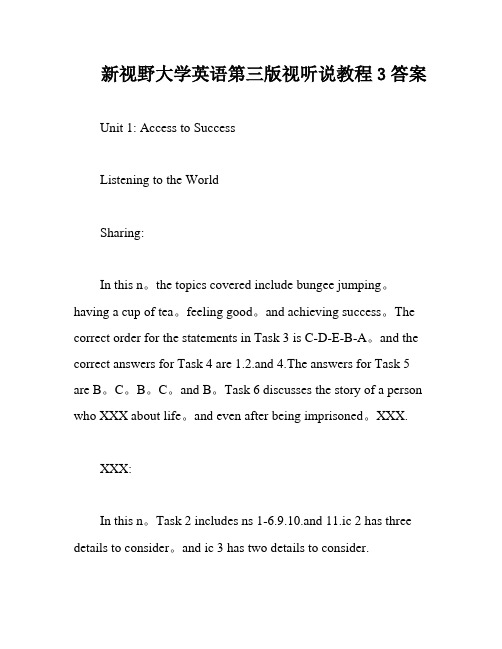
新视野大学英语第三版视听说教程3答案Unit 1: Access to SuccessListening to the WorldSharing:In this n。
the topics covered include bungee jumping。
having a cup of tea。
feeling good。
and achieving success。
The correct order for the statements in Task 3 is C-D-E-B-A。
and the correct answers for Task 4 are 1.2.and 4.The answers for Task 5 are B。
C。
B。
C。
and B。
Task 6 discusses the story of a person who XXX about life。
and even after being imprisoned。
XXX.XXX:In this n。
Task 2 includes ns 1-6.9.10.and 11.ic 2 has three details to consider。
and ic 3 has two details to consider.Viewing:Task 3 in this n has only one answer。
which is 3.Task 4 asks for the correct order of the events。
which is e-g-c-b-f-a-d。
Task 5 discusses the XXX in just 90 minutes。
He had to focus and make this challenge。
which involved running seven miles。
in just four months.Speaking for nRole-play:In Task 1.the correct answer is B。
新视野大学英语第三版读写教程第三册Unit3课文原文(A+B篇)
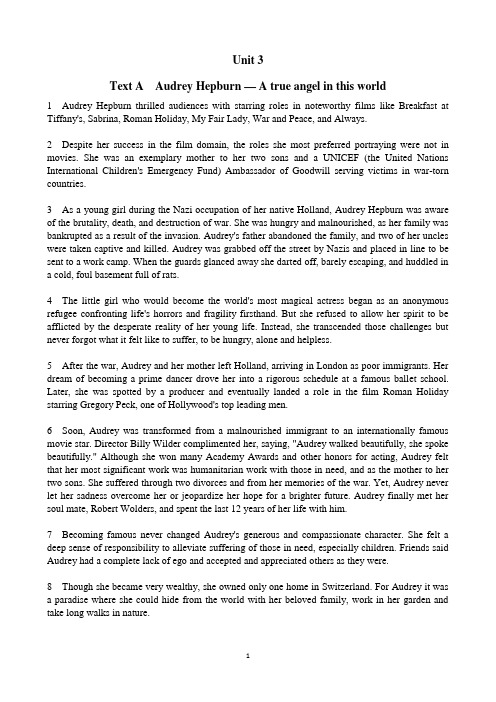
Unit 3Text A Audrey Hepburn — A true angel in this world1 Audrey Hepburn thrilled audiences with starring roles in noteworthy films like Breakfast at Tiffany's, Sabrina, Roman Holiday, My Fair Lady, War and Peace, and Always.2 Despite her success in the film domain, the roles she most preferred portraying were not in movies. She was an exemplary mother to her two sons and a UNICEF (the United Nations International Children's Emergency Fund) Ambassador of Goodwill serving victims in war-torn countries.3 As a young girl during the Nazi occupation of her native Holland, Audrey Hepburn was aware of the brutality, death, and destruction of war. She was hungry and malnourished, as her family was bankrupted as a result of the invasion. Audrey's father abandoned the family, and two of her uncles were taken captive and killed. Audrey was grabbed off the street by Nazis and placed in line to be sent to a work camp. When the guards glanced away she darted off, barely escaping, and huddled ina cold, foul basement full of rats.4 The little girl who would become the world's most magical actress began as an anonymous refugee confronting life's horrors and fragility firsthand. But she refused to allow her spirit to be afflicted by the desperate reality of her young life. Instead, she transcended those challenges but never forgot what it felt like to suffer, to be hungry, alone and helpless.5 After the war, Audrey and her mother left Holland, arriving in London as poor immigrants. Her dream of becoming a prime dancer drove her into a rigorous schedule at a famous ballet school. Later, she was spotted by a producer and eventually landed a role in the film Roman Holiday starring Gregory Peck, one of Hollywood's top leading men.6 Soon, Audrey was transformed from a malnourished immigrant to an internationally famous movie star. Director Billy Wilder complimented her, saying, "Audrey walked beautifully, she spoke beautifully." Although she won many Academy Awards and other honors for acting, Audrey felt that her most significant work was humanitarian work with those in need, and as the mother to her two sons. She suffered through two divorces and from her memories of the war. Yet, Audrey never let her sadness overcome her or jeopardize her hope for a brighter future. Audrey finally met her soul mate, Robert Wolders, and spent the last 12 years of her life with him.7 Becoming famous never changed Audrey's generous and compassionate character. She felt a deep sense of responsibility to alleviate suffering of those in need, especially children. Friends said Audrey had a complete lack of ego and accepted and appreciated others as they were.8 Though she became very wealthy, she owned only one home in Switzerland. For Audrey it wasa paradise where she could hide from the world with her beloved family, work in her garden and take long walks in nature.9 In 1988, Audrey was appointed a Goodwill Ambassador for UNICEF designed to provide emergency food and healthcare to children suffering the destruction of war or other catastrophes. In that role, her lifelong passion for helping those in need, found its greatest calling.10 She turned down three million dollars to pen her autobiography and instead accepted one dollar a year in the more conscientious role as diplomat for UNICEF. For seven months out of each of her last five years, she and Robby left the peace and beauty in their cozy home to embark on outreach trips into some of the most difficult places on earth. From Bangladesh, Sudan, India, Vietnam, Kenya, Ethiopia, Central and South America, to Somalia, Audrey Hepburn traveled representing UNICEF, making over 50 emotionally draining and physically dangerous missions into bleak destinations to raise world awareness of wars and droughts. Having been a victim of war, she understood the blessing of being the beneficiary of food, clothing, and, most of all, hope.11 Audrey felt it was wicked that billions of children were deprived of simple joys and drowned in overwhelming misery. She believed deeply in the ideology that all people share in the duty to care for those in need. Audrey Hepburn was always ready to lead by example. She said: "When you deny childhood, you deny life." She saw UNICEF's work as an integral, sacred force in people's lives and said of UNICEF's results, "Anyone who doesn't believe in miracles is not a realist."12 In 1992, Audrey was stricken by cancer. She, Robby and her two sons returned to their home in Switzerland for their last Christmas together.13 Audrey's long-time friend and world-famous French fashion designer, Hubert de Givenchy, spoke to his cherished friend for the last time, just before she died. He said she was "... serene at the end because she knew she had achieved everything with perfection".14 Audrey Hepburn's passion for service was enduring. Even as her life ended at 63 years of age, she remained a gracious woman who perpetually signified simplicity, charity, charm and kindness.15 The majesty of Audrey Hepburn's spirit of social responsibility and dedication lives on in her words: "Remember, if you ever need a helping hand, it's at the end of your arm. As you get older, remember you have another hand: The first is to help yourself, the second is to help others." And "For beautiful eyes, look for the good in others; for beautiful lips, speak only words of kindness; and for poise, walk with the knowledge that you are never alone."Unit 3Text B A life in filmSteven had to face rejections and obstacles in his film-creating efforts, but his persistence and dedication transformed the obstacles into an alternative route to success.1 At 12 years old, Steven Spielberg was already visiting film shootings at Universal Studios in his office suit, a packed lunch tucked into his briefcase. The young boy tried to immerse himself in film in any way possible. He had been given an administrative job at Universal Studios from a friend of his father's, and every day, even though he didn't have a legitimate security pass, he would try to manipulate his way past the guards and into his personal paradise. Such persistence is hardly surprising from a boy whose lifelong conviction was to "Make sure you are right and go on!" (adopted from a 1954 Disney film).2 When Steven was eight years old, his father gave him a Brownie 8 mm film camera as his birthday present. Steven immediately began collecting footage of family events, and he simulated action scenes with his miniature toy spacecraft, populating his films with his neighborhood friends as actors. People quickly began to recognize his terrific talent, and he won a prize for cinematography for his early westernThe Last Gunfight; years later, he won a national contest for his film Escape to Nowhere. His film Firelight was twice analyzed by a national newspaper and was presented in the city theater as if it were a Hollywood premiere. By the time he was 17 years old, Steven had established himself as a director with the artistic intuition of a man twice his age.3 His achievements are certainly related to the personal obstacles and setbacks he faced from an early age. Steven's family moved often, so that he was constantly trying to find his place in a turbulent environment with new people. Despite his natural intelligence, Steven had a carefree attitude and put little effort into school. He consistently earned only a C average, or lower. Socially, he wasn't athletic or popular, and since his conspicuous interest in film made him seem eccentric, classmates shunned and mocked him.4 His home life was not ideal either, as his father's rigid engineering temperament could not understand his or his mother's artistic personalities. Steven would miss his father when he was gone for long work trips, and then reverted to furiously arguing with him as soon as he returned. Finally, when he was in high school, his parents ended their unhappy marriage with a divorce. The theme of the lack of a father figure consistently infected Steven's films.5 Unfriendly surroundings at home and school made Steven strive even harder to achieve in the film world. He applied to two of the best film schools in the country: the University of Southern California and the University of California, Los Angeles. But even with a formidable 10 years of experiences in filmmaking and his friends atUniversal Studios endorsing him, his grades were too poor, and he was flatly turned down at both institutions.6 Unwilling to give up, Steven entered the California State University, where he hoped the program in TV and radio might open his way to Hollywood. Unfortunately, the university was not suited to his experience, and one academician recalled, "Steven knew more about cameras, mounts, and lenses than anyone else in the department. He could teach there." Despite his manifest talent, his low grades sabotaged transfer attempts, forcing real film schools to withhold acceptance.7 Steven contrived to rectify the situation on his own by diverting his attention away from academics. He cleaned his old suit and briefcase and returned to visiting Universal Studios where he had worked as a boy. He discreetly sneaked into any department he could, such as shooting rooms, editing and sound-mixing studios, and he quietly watched until he was discovered and ordered to leave. Introducing himself under the pretext of being either an actor, director, or producer, he would invite people to dinner to make connections and learn as much as he could. Even though he was caught and expelled at least once a day, he always returned to smuggle himself back in again.8 Steven repeatedly tried to prove himself to the Universal executives, while working in a cafeteria to save up money for equipment. He would discretely create scenes and then shoot and re-shoot his movies. He kept upgrading from 8 to 16 and finally 35 mm film before he was allowed a screening. Finally, his film Amblin was given a chance in front of the executives. It was a short, silent film and the plot differed greatly from the sci-fiand combat films that would later predominate Steven's career. Still, the short film was awesome enough to win Steven, only 21 years old, a seven-year contract with Universal Studios.9 After directing smaller TV dramas and low-budget projects, Steven earned the chance to direct his big Hollywood debut: a thriller film starring a shark! Jaws was a box office hit and it made Steven famous. He continued his relationship with Universal Studios to produce the notable moviesE.T., Jurassic Park, and Schindler's List.10 As his first producer said, "It is not by any coincidence that Steven is in his present position." Instead, it is Steven's committed spirit that has strengthened him in standing fast against all rejections, prejudice and skepticism and driven him to keep moving onward.。
新视野商务英语综合教程unit3

新视野商务英语综合教程unit31. IntroductionThe third unit of the New Horizon Business English Comprehensive Course is an important module that covers various topics related to business communication. In this unit, students will learn about effective negotiations, making and responding to offers, and discussing terms and conditions.2. Negotiation SkillsNegotiation plays a crucial role in business interactions. Being able to negotiate effectively can help individuals achieve winwin outcomes. In this section, students will learn about different negotiation strategies, such as focusing on interests, exploring alternatives, and mntning a cooperative mindset. Additionally, they will learn how to handle conflicts that may arise during negotiations.3. Making OffersMaking offers is a common practice in the business world, and it requires careful consideration of various factors. In this unit, students will learn how to make offers using appropriate language and tone in written and verbal communications. They will also learn about the importance of clarity and specificity when making offers, as well as the role of timing and flexibility.4. Responding to OffersResponding to offers is an essential skill that business professionals need to master. This section will focus on teaching students how to respond to offers in a polite and professional manner. They will learn how to accept offers, reject offers, and make counter offers effectively. Additionally, they will learn about the importance of mntning good relationships during the negotiation process.5. Discussing Terms and ConditionsDiscussing terms and conditions is a crucial step in any business negotiation. Students will learn about the key terms and conditions that should be considered when negotiating contracts or agreements. They will also learn about the importance of clear and concise communication during this process. Additionally, students will gn an understanding of how to handle any disagreements that may arise during discussions about terms and conditions.6. Case StudiesTo reinforce the concepts learned in this unit, students will engage in case studies and roleplaying activities. These activities will allow them to apply their negotiation skills and practice making and responding to offers in realistic business scenarios. Through these interactive exercises, students will gn confidence in their ability to navigate reallife business situations.7. ConclusionUnit 3 of the New Horizon Business English Comprehensive Course provides students with a solid foundation in negotiation skills, making and responding to offers, and discussing terms and conditions. mastering these skills, students will be better equipped to succeed in various business contexts. Through interactive activities and case studies, students will have the opportunity to apply their knowledge and strengthen their communication and negotiation abilities.。
- 1、下载文档前请自行甄别文档内容的完整性,平台不提供额外的编辑、内容补充、找答案等附加服务。
- 2、"仅部分预览"的文档,不可在线预览部分如存在完整性等问题,可反馈申请退款(可完整预览的文档不适用该条件!)。
- 3、如文档侵犯您的权益,请联系客服反馈,我们会尽快为您处理(人工客服工作时间:9:00-18:30)。
-in-law
• Father-in-law, mother-in-law, brother-in-law, sister-inlaw, son-in-law
Jump in,Join in a conversation suddenly
• It is impolite to jump in when people are talking about real business.
• I have no sympathy with such a man. Antipathy • He was in sympathy with their views. Sympathetic, sympathize Symphony, synonym, symmetry
Language points
交纸质作业或Email给我均可。一周后交齐。
Review
The woman told him what had happened. What I have said is nonsense to her. I don’t think… I don’t think I know you. It will not rain tomorrow. I don’t think it will rain tomorrow. Wherever there is love, there is wealth and success as well. Wherever you go, whatever you do, I will be with you.
日期: 1999年6月2日 写信人: Sam 收信人: Tom 内容: 感谢对方5月15日的来信,本人对夏季在贵校任教很感兴趣。对所提 的问题答复如下: 1、可在周三、周四的上午或下午上课,最好是下午上课。 2、可提供所需全部材料,每个学生的材料费30元 随信寄上授课计划(Teaching plan)一份。
Language points
Take someone’s advice, accept…
• I’ll take your advice and get more exercise every day.
Amaze, surprise
• We were amazed to hear that Jack passed his driving test, as he has such poor eyesight.
Be different
• They come from different countries and their cultures differ from one another Difference, It makes no difference which side may win. Different, A goat is different from a sheep.
Language points
Somehow, by some means
• He had his car stolen and got it back somehow one week later.
for some reason that is not clear
• He was young, but his face somehow gave off the impression of age.
Language Points
Post, post office, postgraduate, postpone, postwar, postcentral, postdate Matter, make difference, it doesn’t matter Cry out, shout loudly
Language points
Recognize, know again
• It is true that dogs recognize people by their smell.
Acknowledge
• I recognized the new government.
recognition Sympathy, compassion
Language points
Since that is the case, such being the case. Fill with, make or become full
• The room was filled with laughter and they all had a good time. • The waitress filled my glass with coffee.
Wherever there is love, there is also wealth and success.
• Wherever there is love, there is wealth and success as well. • Wherever you go, whatever you do, I will be with you.
Unit 3
Stories
Wealth, Success and Love
How was your last week? Did you enjoy the sports meeting? Did you read English books/ stories in your spare /leisure time? What kinds of stories do you like most? Jokes fairy tales fables detective stories love stories Kongfu stories
I don’t think,
• I don’t think I know you. • I don’t think it will rain.
Point to, indicate the direction
• The old man pointed to the house, saying that was his home.
Rபைடு நூலகம்view
Suggestion on spending the weekend: Go hiking to the Lushan Mountain, shopping, studying in the Library… Why don’t we invite love? How about…? What about…? Why don’t we go hiking to the Lushan Mountain? How about going shopping on this weekend? What about studying in the library this weekend? Why don’t you tell your parents the truth?
• Please answer the following questions …
Next, The exam is to be held the following week.
Language points
Find out, I find out a new method. I cannot find out where he has gone. Out of,
Review
It makes no difference which side may win. The exam is to be held the following week. Symphony, brother-in-law
Language Points
Error, fault, mistake Take part in, participate in the sports meeting Fashionable, red is in fashion, out of fashion ambassadress, waitress, stewardess, hostess, actress Popular, he is popular with the students Smart, you are smart, look smart, look sharp Dancing hall, dining hall On top of the world, in high spirits Course, Despite, in spite of,
Add, say also
• He drank some water and then added, “you did a good job.”
Extremely, very, highly
• Mary got extremely angry with Tom when she knew that Tom cheated her.
As well, in addition, also, too
• Jack plans to do some part-time work during the weekends, and go over his lessons as well.
Following, that is to be mentioned now
Exercise
Directions: This part is to test your ability to do practical writing. You are required to write a letter of reply according to the following information. You should write no lesson than 80 words in the Composition Sheet.
Language points
